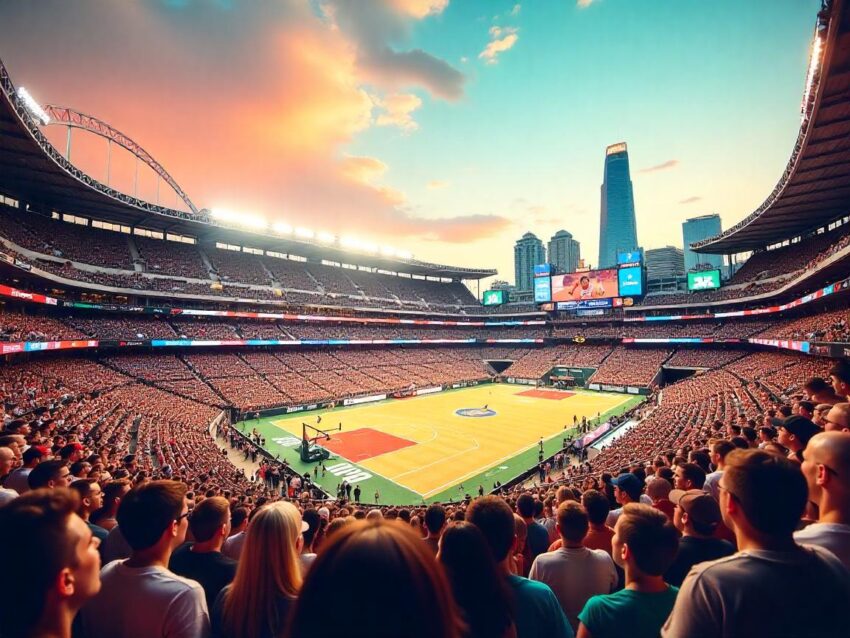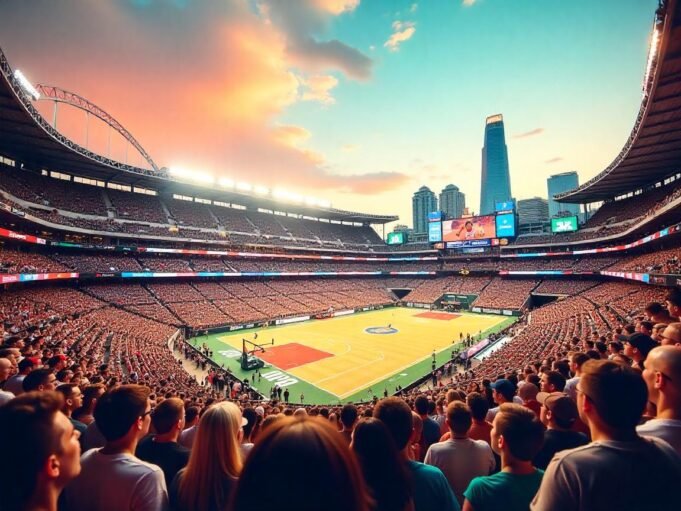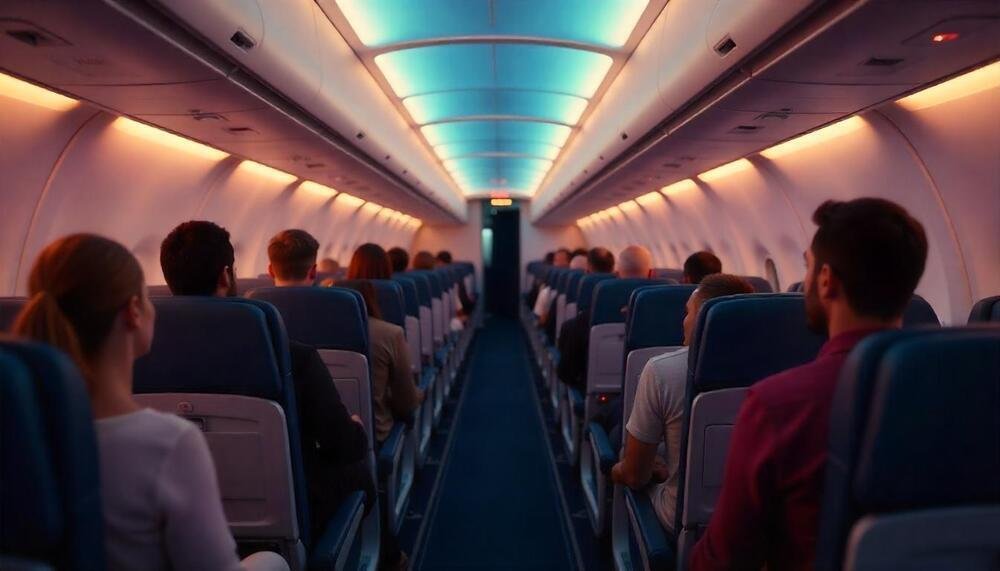Tuesday, July 8, 2025

Across the United States, cities are reimagining what it means to be a destination by embracing the power of sports tourism. Las Vegas, once known mainly for its casinos and neon lights, is now stepping confidently onto the same stage as Atlanta, Indianapolis, Dallas, Orlando, and Charlotte—cities that have turned sporting events into year-round economic engines.
From Super Bowls and NCAA championships to youth tournaments and Formula 1 races, these hubs are proving that sports can drive growth far beyond the stadium gates. Visitors flock in to cheer on their teams, but they also fill hotels, restaurants, and attractions, creating lasting economic ripple effects.
As more cities invest in modern arenas, flexible event spaces, and strategic marketing, the competition to become America’s premier sports tourism destination is heating up. This shift is redefining travel itself, transforming games into powerful catalysts for community development and city branding.
Vegas Sets Sights on the Final Four
Las Vegas is gearing up to host one of college basketball’s biggest spectacles for the very first time.
On Tuesday, the Las Vegas Convention and Visitors Authority (LVCVA) Board of Directors will vote on allocating a hefty $26 million to secure the NCAA Men’s Basketball Tournament Final Four in 2028. Slated for April 1 and 3 at Allegiant Stadium, the event represents a milestone in Vegas’s transformation into a sports powerhouse.
The funding would cover infrastructure, services, and activations to meet strict NCAA requirements. The goal? To deliver an unforgettable experience that spotlights Vegas as a global stage for world-class sports.
Officials predict the Final Four will generate significant economic impact and worldwide media coverage, further cementing Las Vegas’s reputation as a city built for mega-events.
Hosting Sports Means Big Dollars and Global Buzz
The allure of sports extends far beyond game-day excitement. For Las Vegas, sports are fast becoming a strategic driver of tourism and economic growth.
Major sports events create waves of hotel bookings, dining demand, and entertainment spending. Even more crucially, they shine a spotlight on the Las Vegas skyline, broadcasting images of the city’s vibrant energy to millions of fans worldwide.
Las Vegas has already hosted major sporting moments, including the West Regional of the NCAA tournament in 2023 at T-Mobile Arena. Now, officials are determined to take the leap from regional host to the national sports stage.
Every high-profile event Las Vegas lands feeds the city’s brand as a destination that thrives on spectacle. Sports, officials say, deliver more than just crowds; they deliver priceless marketing exposure.
A Chief Sports Officer for the “Sports and Entertainment Capital of the World”
As part of its aggressive sports strategy, the LVCVA plans to create an executive-level position: Chief Sports Officer.
This new role will focus on forging relationships, bidding for future events, and steering sports tourism into a pillar of Las Vegas’s visitor economy. The title signals how central sports have become to the city’s future.
Sports have evolved into more than just attractions—they’re integral to the city’s identity as the “Sports and Entertainment Capital of the World.”
The Chief Sports Officer will be tasked with ensuring Las Vegas continues to dominate headlines and secure a steady flow of visitors who come for the thrill of competition as much as for the casinos and entertainment.
Bringing the Sports Industry to Town: Sports ETA Symposium 2026
The LVCVA isn’t stopping at hosting sports events alone. The city is eyeing the influential sports tourism business community as a growth engine.
The board will also consider investing $400,000 to bring the Sports Events & Tourism Association (Sports ETA) Symposium to Las Vegas from April 21-23, 2026.
This annual gathering is the premier event for professionals who shape the sports events industry, including destinations, rights holders, venues, and suppliers. More than 1,000 industry leaders gather for networking, education, and deal-making.
By hosting Sports ETA, Las Vegas positions itself not just as a venue for major games but as a hub for sports business and strategy. The event will provide valuable opportunities to showcase the city’s unparalleled capacity to host massive events and deliver world-class experiences.
Las Vegas Has Built the Perfect Stage
Las Vegas’s bid to dominate the sports tourism market is built on decades of investment. The city’s infrastructure—modern stadiums, world-class arenas, expansive convention centers, and endless hotel rooms—creates an unmatched stage for hosting any sport on Earth.
Industry experts say this investment is paying off. Las Vegas has emerged as an “event city,” drawing fans not merely for the game, but for the overall experience. Visitors arrive for a sports event and stay longer to enjoy shows, fine dining, shopping, and nightlife.
Events like Formula One racing, with the Strip transformed into a racing circuit, generate enormous free global publicity. Hollywood, too, has taken notice, with movies like Brad Pitt’s F1 film spotlighting Vegas as a glamorous backdrop.
Sports Flatten Vegas’s Tourism Curve
Another critical benefit of sports tourism? Smoothing out seasonal highs and lows.
Historically, Las Vegas has faced quiet periods when tourist traffic dips. Sports events help “flatten the curve” by filling hotel rooms and restaurants during slower months.
For example, nearly 60% of fans attending Las Vegas Raiders games at Allegiant Stadium are visitors. These travelers bring significant economic benefits beyond ticket sales, contributing to hotel stays, dining, entertainment, and gaming revenue.
Beyond Gambling: Sports as the Future of Las Vegas Tourism
Las Vegas has long been synonymous with gambling. But with casinos proliferating in many states, simply betting on gaming revenue isn’t enough. The city’s vision is broader—to become an epicenter for entertainment, sports, and global events.
Sports provide a compelling reason for people to choose Las Vegas over other destinations. They also attract demographics that spend heavily on experiences, extending their stays and exploring more of what the city offers.
Las Vegas’s ability to seamlessly blend sports, hospitality, and entertainment into a single dazzling package gives it an edge few cities can match.
All Eyes on Vegas for 2028 and Beyond
The stakes for hosting the 2028 Final Four are enormous. A successful event could solidify Las Vegas as a permanent contender for future marquee sports events, from NCAA tournaments to Super Bowls and global spectacles.
With infrastructure in place and a growing reputation for pulling off extraordinary events, Las Vegas is betting big that sports will define the next era of its tourism industry.
As the LVCVA prepares to greenlight major investments, the message is clear: Las Vegas isn’t just a place to roll the dice—it’s becoming the ultimate destination where sports and spectacle collide.
Across the United States, cities are discovering that sports are more than just games—they are powerful engines driving travel, business, and community development. Sports tourism, once a niche segment of the visitor economy, has grown into a fully-fledged industry in many destinations, creating jobs, filling hotel rooms, and redefining how cities brand themselves to the world.
From Las Vegas’s glittering stadiums to Indianapolis’s amateur sports roots, cities are proving that investing in sports isn’t merely about entertainment—it’s an economic strategy with far-reaching impacts.
A Booming Sector Worth Billions
Sports tourism is one of the fastest-growing sectors of the travel industry. According to the Sports Events & Tourism Association (Sports ETA), the industry contributed more than $52 billion in direct spending across the United States in 2023, with the momentum continuing into 2025.
This spending ripples across local economies. Visitors come not only for tickets but also for hotel stays, dining, shopping, and other attractions. Major events can also generate lasting media exposure, shining an international spotlight on host cities.
The days when sports tourism was limited to major professional games are long gone. Today, youth tournaments, amateur championships, esports competitions, and niche sporting events all feed into the industry’s vast economic footprint.
Las Vegas: From Gambling Hub to Sports Capital
Perhaps no U.S. city exemplifies the transformation of sports tourism better than Las Vegas. Once known purely for its casinos and entertainment acts, the city has repositioned itself as a global sports destination.
In 2024, Las Vegas hosted the Super Bowl at Allegiant Stadium, drawing enormous crowds and record-breaking spending. The city is set to host the NCAA Men’s Final Four in 2028 for the first time—a milestone in its evolution as a sports hub.
Formula One’s Las Vegas Grand Prix has further elevated the city’s profile, turning the Strip into a dazzling racetrack broadcast worldwide. Industry analysts estimate that nearly 60% of attendees at Raiders NFL games are out-of-town visitors, underscoring sports’ role in driving tourism.
Investments in state-of-the-art venues and strategic marketing have enabled Las Vegas to build a reputation not just as a gambling haven, but as a city capable of hosting virtually any major sporting event.
Atlanta: The Power of Diverse Sports Events
Atlanta has long been a significant player in sports tourism, leveraging its infrastructure to attract diverse events. The city’s Mercedes-Benz Stadium hosts NFL and Major League Soccer matches, NCAA championships, and concerts that draw fans from around the country.
But Atlanta’s sports tourism success extends beyond professional leagues. The region has become a hotspot for youth sports, with facilities like LakePoint Sports attracting thousands of families for tournaments.
Industry data suggests sports tourism contributes over $2.5 billion annually to the metro Atlanta economy, making it one of the city’s most significant tourism sectors.
By blending professional events with youth and amateur competitions, Atlanta ensures steady visitor flow throughout the year, avoiding reliance on a few marquee events.
Indianapolis: A Legacy as the Amateur Sports Capital
Indianapolis has carved out a unique identity as the “Amateur Sports Capital of the World.” The city is home to the NCAA headquarters and hosts a steady rotation of national collegiate events.
Lucas Oil Stadium has seen everything from NFL games to NCAA Final Fours and Super Bowl matchups. Yet what truly distinguishes Indianapolis is its long-standing strategy of using sports as economic development.
The Indiana Sports Corp., the country’s first sports commission, has for decades coordinated efforts to bring events to the city. In 2023, sports tourism contributed roughly $4 billion to the local economy, with youth and amateur events forming a significant share.
Indy’s formula—a proactive sports commission, centralized event facilities, and a walkable downtown—remains a model for other cities hoping to turn sports into a sustainable economic pillar.
Dallas-Fort Worth: Big Events, Big Impact
Everything is bigger in Texas, including sports tourism. The Dallas-Fort Worth region has become a magnet for major events, thanks in part to iconic venues like AT&T Stadium and Globe Life Field.
These stadiums have hosted Super Bowls, NCAA championships, WrestleMania, and global soccer matches. North Texas also boasts a thriving youth sports scene, with facilities like The Star in Frisco serving both professional teams and amateur tournaments.
Sports tourism generates an estimated $4.5 billion annually across the Dallas-Fort Worth area. The region’s ability to host diverse events ensures a year-round influx of visitors, supporting hotels, restaurants, and local businesses.
Orlando: Where Sports Meet Theme Parks
Orlando’s tourism industry has long been anchored by theme parks, but sports are increasingly becoming a significant draw. The ESPN Wide World of Sports Complex hosts large-scale amateur and youth events, driving significant visitation outside traditional holiday seasons.
The city also regularly hosts NCAA games, bowl games, and other sports events. Orlando’s unique strength lies in combining sports with family attractions, creating multi-purpose trips for visitors.
In 2023, Orlando generated over $3 billion in sports tourism revenue, underscoring the city’s diverse tourism base. Sports not only bring new travelers but help spread visitation throughout the year, reducing reliance on peak theme park seasons.
Emerging Sports Cities: Charlotte, Nashville, Phoenix, and More
Beyond the major sports hubs, several U.S. cities are emerging as rising stars in sports tourism:
- Charlotte, NC: Driven by NASCAR tourism, collegiate tournaments, and an expanding soccer presence, sports contribute an estimated $2 billion annually to the city’s economy.
- Nashville, TN: Music City Bowl, SEC tournaments, and a growing reputation for hosting diverse sports events have made sports tourism a $1.5 billion sector in Nashville.
- Phoenix, AZ: Home to the Super Bowl, College Football Playoff games, spring training baseball, and PGA golf tournaments, Phoenix sees roughly $3.5 billion in annual sports-related spending.
- Minneapolis-St. Paul, MN: With U.S. Bank Stadium, extensive winter sports, and strong youth hockey, the Twin Cities generate over $2 billion yearly from sports tourism.
- Miami, FL: Formula 1, Super Bowl, and diverse Latin American sports events drive an estimated $2.8 billion annually in sports tourism.
The Future: Sports as a Strategic Investment
Cities are no longer viewing sports simply as entertainment. Instead, they recognize sports tourism as a strategic investment that fuels economic growth, brand recognition, and global visibility.
Key trends shaping the future include:
- Growth in youth and amateur sports tourism
- Flexible, multi-use stadiums and venues
- Rising importance of global sports like Formula 1
- Increased focus on legacy impacts, ensuring events benefit local communities long after the games end
Sports also serve as powerful marketing tools. Global broadcasts of events like Formula 1 races or major championships bring priceless exposure, promoting cities as vibrant destinations far beyond the sporting arena.
Sports Tourism as an Industry in Its Own Right
What once was a sideline attraction has become a central pillar of tourism economics. Across the United States, cities large and small are proving that sports tourism is not just about cheering crowds but about sustainable growth, community pride, and economic resilience.
As cities continue to invest in venues, bid for events, and innovate with new experiences, sports tourism is poised to remain one of the most dynamic forces shaping the American travel industry for years to come.











